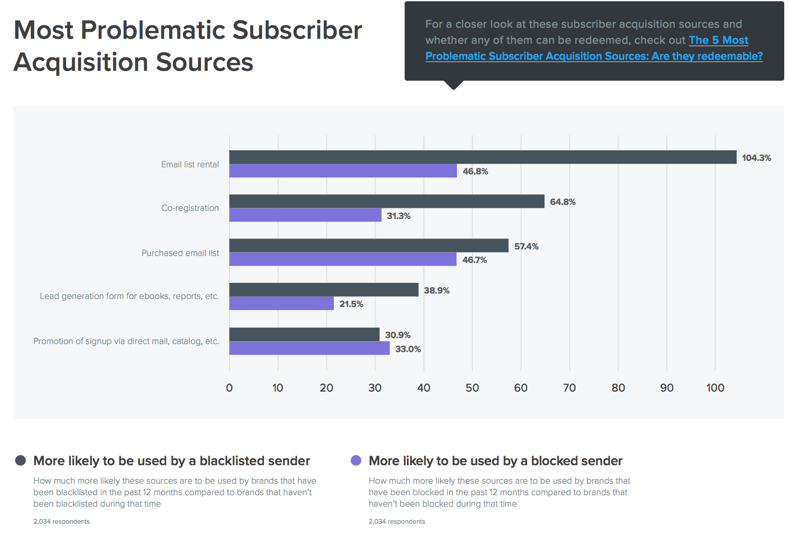Co-Reg
Audiences, targeting and signups
A few weeks ago we closed on our new house in Dublin. This weekend we’re going to one of those ‘home shows’ where people try and sell you all sorts of things for your home. We know there are some things we want to do with the house so we’re headed out to the convention centre this weekend. Tickets are “free” but they ask for contact information, including an email address.
Read MoreState of Email Deliverability
I had other posts in the pipeline, but saw a link to the Litmus 2017 State of Email Deliverability Report and decided that deserved a mention here.
There’s all sorts of interesting data there, and well worth a download and read. I was, of course, interested in the “most problematic subscriber acquisition sources.” Senders having blocking issues or blacklist problems in the past 12 months use list rental, co-reg and purchased lists more often than senders that didn’t have problems.
Senders acquiring addresses through list rental are 104% more likely to be blacklisted than senders not using list rental. And they’re 47% more likely to be blocked.
These stats are the primary reason that most ESPs don’t allow list rentals, purchased or co-reg lists. They cause blocking and blacklisting. The ESP ends up having to deal with lots of problems and clean up the mess.
I’m unsurprised that lead generation by giving something away (a report, ebook, whatever) is related to problems. Most of these forms do little to no data checking and accept any and all fake data. There are fairly simple ways to enforce better data, but that does limit the spread of the information.
I am surprised to see signup through direct mail and catalog sales is so bad. Unless maybe people don’t know how to say no when asked for an email address over the phone. I know it seems awkward to say no when asked for an email address. Maybe some folks are giving fake addresses. I sometimes say I don’t have email, or just tell them no, they don’t need one.
The white paper itself is well worth a read. Go download it yourself (but don’t give them a fake email address!).
It's the recipients
Most delivery problems to US ISPs boil down to sending mail to people who don’t want it or expect it. Sure, we do technical audits and find issues with how companies are sending mail. But all the technical correctness in the world isn’t going to make up for sending mail users complain about or don’t interact with.
Recently we were working with a client who was having some delivery problems for one mail stream. As we dug down into the issue, we discovered a couple things about the mail stream.
The legitimate email marketer
I cannot tell you how many times over the last 10 years I’ve been talking to someone with a problem and had them tell me “but I’m a legitimate email marketer.” Most of them have at least one serious problem, from upstreams that are ready to terminate them for spamming through widespread blocking. In fact, the practices of most companies who proclaim “we’re legitimate email marketers” are so bad that the phrase has entered the lexicon as a sign that the company is attempting to surf the gray area between commercial email and spam as close to the spam side of that territory as possible.
What do I mean by that? I mean that the address collection practices and the mailing processes used by self-proclaimed legitimate email marketers are sloppy. They don’t really care about individual recipients, they just care about the numbers. They buy addresses, they use affiliates, they dip whole limbs in the co-reg pool; all told their subscription practices are very sloppy. Because they didn’t scrape or harvest the email address, they feel justified in claiming the recipient asked for it and that they are legitimate.
They don’t really care that they’re mailing people who don’t want their mail and really never asked to receive it. What kinds of practices am I talking about?
Buying co-reg lists. “But the customer signed up, made a purchase, took an online quiz and the privacy policy says their address can be shared.” The recipient doesn’t care that they agreed to have their email address handed out to all and sundry, they don’t want that mail.
Arguing with subscribers. “But all those people who labeled my mail as spam actually subscribed!!!” Any time a mailer has to argue with a subscriber about the validity of the subscription, there is a problem with the subscription process. If the sender and the receiver disagree on whether there was really an opt-in, the senders are rarely given the benefit of the doubt.
Using affiliates to hide their involvement in spam. A number of companies use advertising agencies that outsource acquisition mailings that end up being sent by spammers. These acquisition mailings are sent by the same spammers sending enlargement spam. The advertiser gets all the benefits of spam without any of the consequences.
Knowing that their signup forms are abused but failing to stop the abuse. A few years back I was talking with a large political mailer. They were insisting they were legitimate email marketers but were finding a lot of mail blocked. I mentioned that they were a large target for people forging addresses in their signup form. I explained that mailing people who never asked for mail was probably the source of their delivery problems. They admitted they were probably mailing people who never signed up, but weren’t going to do anything about it as it was good for their bottom line to have so many subscribers.
Self described legitimate email marketers do the bare minimum possible to meet standards. They talk the talk to convince their customers they’re legitimate:
Fake privacy policies
I sign up at a lot of websites and liberally spray email addresses across the net. These signups are on behalf of one customer or another and each webform gets its own tagged and tracked email address. I always have a specific goal with each signup: getting a copy of a customer’s email, checking their signup process, auditing an affiliate on behalf of a customer or identifying where there might be a problem in a process. Because I have specific goals, I am pretty careful with these signups and usually uncheck every “share my email address” box I can find on the forms.
In every case the privacy policies of my clients and the things they tell me are explicit in that addresses will not be shared. It’s all opt-in, and email addresses are not shared without permission. Even in the cases where I am auditing affiliates, my clients assure me that if I follow this exact process my address will not be shared. Or so the affiliates have assured them.
Despite my care and the privacy policies on the websites, these addresses occasionally leak or are sold. This is actually very rare, and most of the websites I test never do anything with my address that I don’t expect. But in a couple cases these email addresses have ended up in the hands of some hard core spammers (hundreds of emails a day) and there was no useful tracking I could do. In other cases the volume has been lower, and I’ve watched the progression of my email addresses being bought and sold with morbid fascination.
Today an address I signed up at a website about a year ago got hit with multiple spams in a short time frame. All came from different IPs in the same /24. All had different domains with no websites. Whois showed all the domains were registered behind a privacy protection service. Interestingly, two of the domains used the same CAN SPAM address. The third had no CAN SPAM address at all. None of these addresses match the data I have on file related to the email signup.
It never ceases to amaze me how dishonest some address collection outfits. Their websites state clearly that addresses will not be bought an sold, and yet the addresses get lots of spam unrelated to the original signup. For those dishonest enough to do this they’ll never get caught unless recipients tags and tracks all their signups. Even worse, unless their partners test their signups or their mailing practices, the partners may end up unwittingly sending spam.
Co-reg
Well over half of the clients who come to me with delivery problems admit at some point that one of the ways they collect subscribers is through co-registration. They typically have widespread delivery problems at the major ISPs as well as SBL listings.
John Levine posted over the weekend about his thoughts on co-reg.
